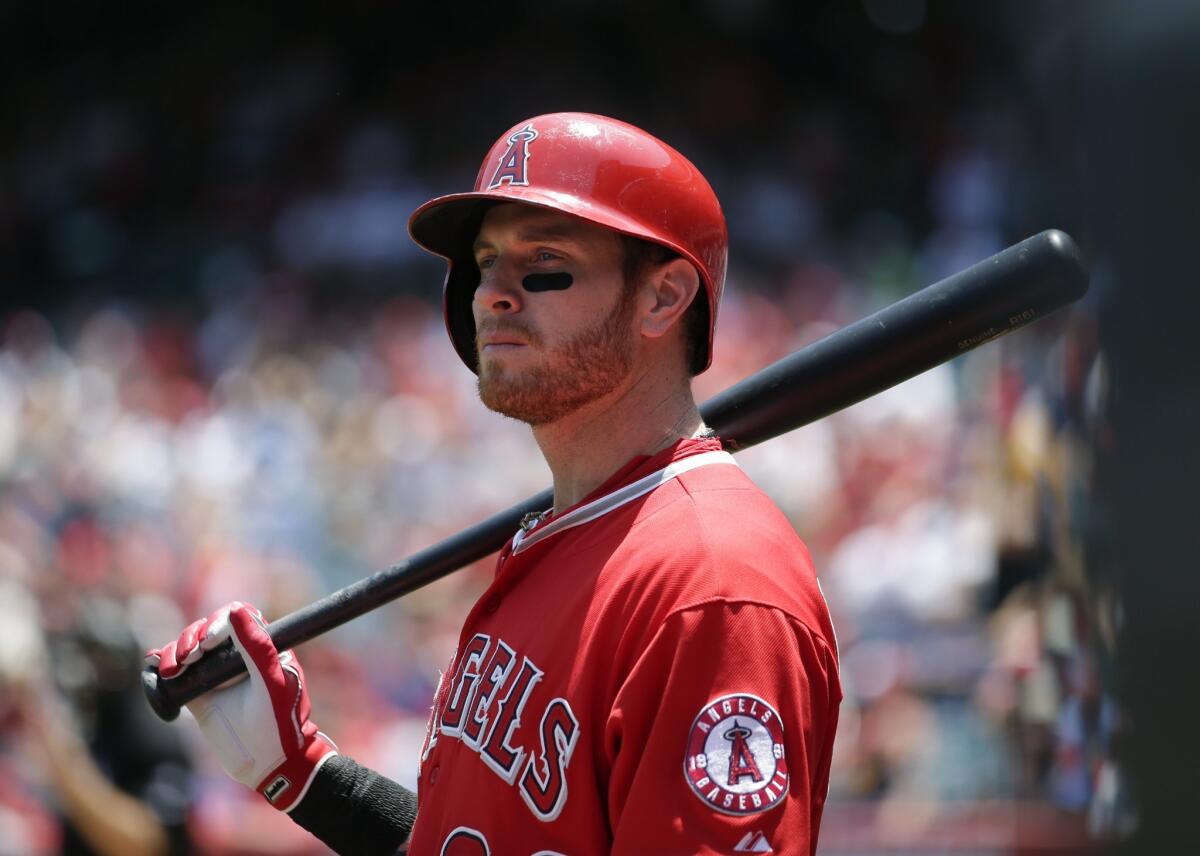Josh Hamilton will not be suspended for substance-abuse relapse

An arbitrator has ruled Josh Hamilton will not be disciplined by Major League Baseball for violating his treatment program.
- Share via
An arbitrator has ruled Angels outfielder Josh Hamilton will not be suspended for a substance abuse relapse, meaning he could return to the club as early as May.
But while several players and Manager Mike Scioscia on Friday expressed support, concern and affection for Hamilton — “We’re pulling for him as a person, more than anything else,” closer Huston Street said —Hamilton won’t necessarily be welcomed back with open arms.
General Manager Jerry Dipoto said in a statement the Angels “have serious concerns about Josh’s conduct, health and behavior,” and team President John Carpino said it “defies logic” that Hamilton’s behavior did not violate the drug program.
The comments came off as insensitive to many who expressed their objections on social media, but Dipoto did not back down from them in a news conference at Angel Stadium before Friday night’s exhibition game against the Dodgers.
“Do I agree with the decision made by the treatment board? Absolutely not,” Dipoto said. “This is a disappointing moment, make no mistake. … We have a responsibility to the human being. We also have a responsibility to the product on the field, the organization, the fan base, the industry. It’s a complicated web.”
Hamilton, who self-reported his use of cocaine and alcohol to the league, was not in camp with the Angels this spring as he rehabilitated from Feb. 4 surgery on his right shoulder.
The five-time All-Star with the Texas Rangers has failed to live up to the expectations of the five-year, $125-million contract he signed before 2013, his two seasons in Anaheim marked by injury and ineffectiveness. His relapse fueled the frustration of a club that has gotten little return on its investment.
“Josh came with a very well-known story of addiction, and we understood the complications that sometimes travel with that,” Dipoto said. “We are not here to short-sell the troubles and reality of addiction. But there is a responsibility, a professional responsibility, to do the job you’re asked to do.
“Every player is going to be held to that standard. That’s just life. … We’ve expressed support for Josh throughout, but we’re not going to sugar-coat what the issues are with the team as we move forward.”
Those issues include the likely distraction Hamilton will cause when he returns and the challenge Scioscia will face in integrating Hamilton back into a lineup that may be better off without him.
Matt Joyce, a 2011 All-Star acquired from Tampa Bay, and Collin Cowgill will share left field in Hamilton’s absence, and Joyce and second-year slugger C.J. Cron will share designated hitter duties. All three have looked strong this spring.
“We’re going to take this process one step at a time,” Scioscia said. “The most important thing is Josh getting himself where he needs to be. Addiction is a terrible thing, and he’s trying to deal with that.”
Dipoto said Hamilton is taking several hundred swings a day off a tee, but he has not resumed full baseball activities. Hamilton would likely need a lengthy minor league rehabilitation assignment before returning.
Like the Angels, Commissioner Rob Manfred disagreed with the arbitrator’s ruling. A statement issued by MLB said he “will seek to address deficiencies in the manner in which drugs of abuse are addressed under the program in the collective bargaining process.”
Hamilton’s case was submitted to a treatment board, which is made up of two attorneys and two physicians —one of each appointed by the commissioner’s office and the players’ union.
The board deadlocked on whether Hamilton violated the policy, and an arbitrator was appointed to break the tie. With no violation, Manfred could not impose any penalty on Hamilton, who may have helped his cause by self-reporting his relapse.
The gist of the ruling, according to a person familiar with the decision but not authorized to comment on it, is that the arbitrator believed Hamilton’s behavior was more of a “slip” than a violation.
“Josh came forward — he admitted fault,” Angels pitcher C.J. Wilson said. “That’s a very manly thing to do in this day and age when everyone’s trying to cover stuff up and buy off people.”
For most of the last eight seasons, Hamilton, who was suspended from baseball from 2004 to 2006, has traveled with an “accountability partner,” whose job is to help Hamilton resist the temptations that could derail his career.
Hamilton downsized the role of his accountability partner in 2014, but Dipoto said Shayne Kelley, who served in a full-time role in 2013, will return this season.
Twitter: @MikeDiGiovanna
Times staff writer Bill Shaikin contributed to this report.
More to Read
Go beyond the scoreboard
Get the latest on L.A.'s teams in the daily Sports Report newsletter.
You may occasionally receive promotional content from the Los Angeles Times.











